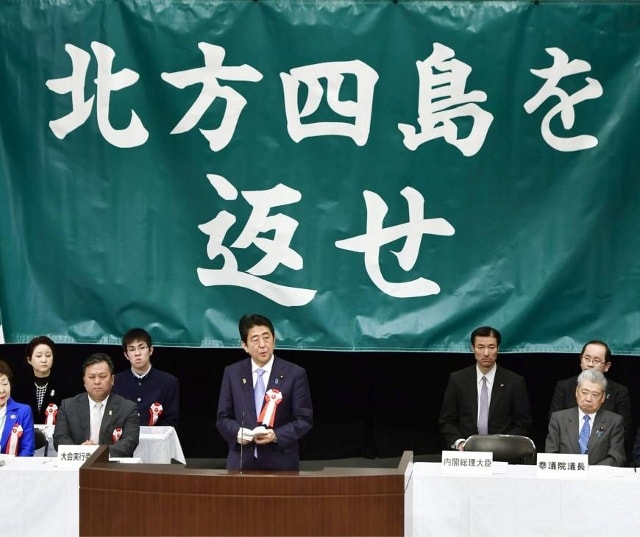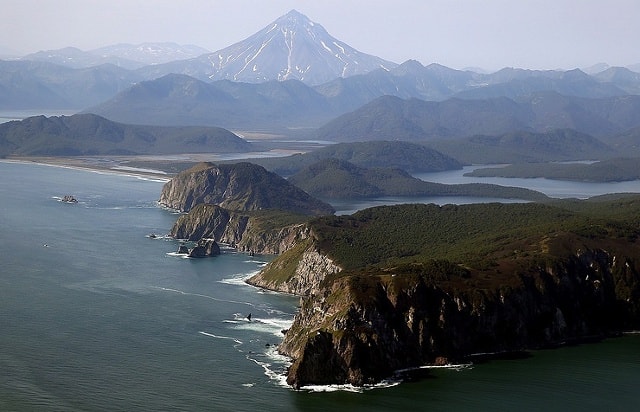Russia - Japan: Resolving territorial disputes from economic perspective
(Baonghean) - Japan and Russia have just announced that they will hold talks in mid-March in Tokyo, Japan, on how to implement joint economic activities on the islands that Russia calls the Southern Kurils and Japan calls the Northern Territories. This is considered an important step towards realizing the determination of both sides in resolving the territorial dispute that has lasted for more than 7 decades on this archipelago.
Economic leverage
To promote joint economic activities on the Southern Kuril Islands/Northern Territories, the Japanese government has established a new committee chaired by Japanese Minister of Economy, Trade and Industry Hiroshige Seko, who is also the minister in charge of economic cooperation with Russia.
The committee members include representatives from the Ministry of Finance, the Ministry of Economy, Trade and Industry, the Ministry of Agriculture, Forestry and Fisheries, the Ministry of Environment and the Ministry of Health, Labor and Welfare. The establishment of the committee follows a summit between Japanese Prime Minister Shinzo Abe and Russian President Vladimir Putin in December last year and ahead of Abe's visit to Russia in the first half of this year.
 |
| Prime Minister Shinzo Abe at Japan's "2017 National Congress for the Restitution of the Northern Territories" on February 7. Photo: Kyodo |
The first projects to be implemented in economic cooperation between the two sides will include fisheries, aquaculture, tourism and nature conservation. However, in the long term, on the basis of cooperation in the disputed archipelago, the two sides also want to expand cooperation to the Far East region, in which the biggest focus will be on energy.
Japanese Prime Minister Shinzo Abe has set a target of Russia meeting more than 40% of Japan's oil and gas needs by 2030. A new phase in Russian-Japanese energy cooperation will soon begin at Yalma in far northern Siberia. This mega-project will allow Russia to supply natural gas to Asia via the Northern Sea Route.
In addition, at the 2nd Eastern Economic Forum held in Vladivostok, Russia in the middle of last year, Russian President Vladimir Putin and Japanese Prime Minister Shinzo Abe agreed on cooperation in investing in the Sakhalin-2 energy project.
Japanese conglomerate Mitsui will invest up to $1 billion to expand the Sakhalin-2 project and leave open the possibility of continuing the Sakhalin-3 project. And it is expected that by 2018, Mitsui will begin construction of a liquefied gas plant on the Yamal peninsula.
Prospects for signing a peace treaty
Territorial disputes have been the most thorny issue in Russia-Japan bilateral relations for more than seven decades. Currently, both Russia and Japan are fully aware of the benefits to both sides through economic cooperation in the disputed islands, and also consider this as a foundation for signing a peace treaty between the two countries.
Russian President Vladimir Putin has said that “the past should not be an obstacle to the future” in Russia-Japan relations. Meanwhile, Japanese Prime Minister Shinzo Abe has also hinted that both sides need to change their approach to resolve this issue:
“As Prime Minister of Japan, I affirm the correct position of Japan, while President Putin is fully confident of the correct position of Russia. If we continue like this, the negotiations will drag on for decades.”
And Japan has demonstrated its goodwill by recently no longer considering territorial settlement as a prerequisite for bilateral cooperation as before – a move that is considered to overcome the “chicken and egg” story that has always hindered the cooperation efforts of both sides.
But according to analysts, despite the new progress in economic cooperation, the path to resolving the territorial dispute between Russia and Japan has not eliminated all obstacles. Prime Minister Shinzo Abe himself admitted at a conference held in Tokyo on February 7 that signing a peace treaty with Russia is not easy.
The biggest difficulty now is that both the Japanese Prime Minister and the Russian President are still quite determined in pursuing the view of “not exchanging territory”. Therefore, what can be expected now is to what extent each side will make concessions within the “special framework” that the two sides are aiming for in the upcoming negotiations.
 |
| Russia and Japan aim to resolve the dispute over the Southern Kuril Islands/Northern Territories through economic cooperation. Photo: TASS |
Win-win
At present, strengthening economic cooperation towards resolving the dispute is considered to be able to bring strategic benefits to both Russia and Japan. In the context of China's rise in the region, including more assertive actions in territorial disputes with Japan in the East China Sea, strengthening relations with Russia can partly help Japan reduce anxiety about the risk of "backdoor cooperation" between Russia and China.
Japan's desire to improve relations with Russia is also part of its strategy to balance relations with major countries instead of relying entirely on US policy as before. In addition, Japan is also in dire need of Russia's support to become a permanent member of the United Nations Security Council in the future.
For Russia, strengthening relations with Japan is in line with its “Look East” policy - the region considered to be the most developed in the 21st century. Moreover, President Putin also does not hide his determination to establish around Russia “an ambitious new international order”.
And this international order will not only require deeper and more effective Russian involvement in international hotspots, but also need to strengthen relations with major, influential countries in the region such as Japan and China. It is expected that more concrete steps for a warm Russia-Japan relationship will be discussed by the leaders of the two countries during the upcoming visit of Japanese Prime Minister Shinzo Abe to Russia.
Thuy Ngoc
| RELATED NEWS |
|---|

